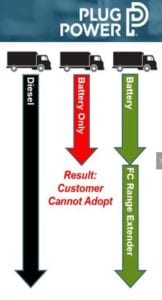ProGen-Powered FedEx operates more than 10,000 miles on-road
Fuel cell electric vehicles (FCV) continue to see increased attention year over year as a promising solution to replace internal combustion engines in goods movement and other energy intensive applications.
On October 11, 2018 Plug Power’s Director of Mechanical Design – Larry Pitts – and FedEx’s Project Engineering Specialist – Phillip Galbach – appeared together on an ACTNews webinar, titled “Delivering on the Promise for Zero-Emission Goods Movement,“ to discuss the latest fuel cell-powered on-road vehicle delivering packages in the Albany, NY area.
The speakers had great information to share – but we still have more! Today, we are taking the opportunity to share information not covered on the webinar, which includes the results of the program to-date.
Plug Power delivered the first ProGen-powered delivery van to FedEx at the start of 2018 – and by May, the vehicle had already covered 3,000 on-road miles. The ProGen-powered electric delivery van is one of the first of its kind to operate in a standard commercial environment and deployed on a standard delivery route for FedEx.
Careful consideration went into the design of the fuel cell vehicle. For example, the hydrogen tanks were placed behind the wheel wells, and designed to hold 11.6 kg of hydrogen on-board without impacting the cargo box space needed for packages. The addition of Plug Power’s ProGen fuel cell enables the vehicle range to exceed 160 miles per delivery cycle, a 166% increase over standard battery power alone.

Today, the ProGen-powered FedEx FCV has traveled more than 10,000 miles (that equates to 500+ fuel cell hours) in varying weather conditions including ice, snow, rain, and extreme heat. Why is this important? Well, it has proven that the Plug Power design is sufficient to withstand harsh elements with above-average reliability and dependability.
This is an elite van, operating 11 hours per day (60-100 miles each day) almost immediately upon its deployment. And, since it’s delivering Plug Power fuel cell equipment, this truck is carrying some of FedEx’s heaviest loads in comparison to its typically delivery van loads.
You may be wondering how we know so much about the system. Well, it’s because the vehicle is equipped with real-time telematic GPS tracking. Plug Power is able to monitor vital parameters for on-board fuel cell, including stack voltage, state of charge, fuel levels, and overall system efficiency.

Plug Power is an extremely customer-centric organization – and we know this work is meaningless if not appreciated by the user. So, what does the driver think? We have the opportunity to hear straight from the source every day when the truck returns to Plug Power to refuel at our vehicle GenFuel hydrogen station. In our conversations with the driver, he has told us that the vehicle is more responsive with quicker acceleration than the incumbent vehicle. It’s also quiet and does not release any diesel odor – since there is no diesel onboard. Pair this with less maintenance from the FedEx crew and we’re seeing acceptance from all sides.

 This project is proving that with hydrogen fuel cells, electric vehicles can be used on all commercial routes as a highly-efficient, highly-sustainable mobility solution. Together, Plug Power and FedEx are delivering on the promise for zero-emission goods movement.
This project is proving that with hydrogen fuel cells, electric vehicles can be used on all commercial routes as a highly-efficient, highly-sustainable mobility solution. Together, Plug Power and FedEx are delivering on the promise for zero-emission goods movement.
During the webinar, attendees asked a lot of excellent questions we were unable to get to. Watch for our next blog on this topic, when we will choose some of the best and provide answers.
#InfiniteDrive